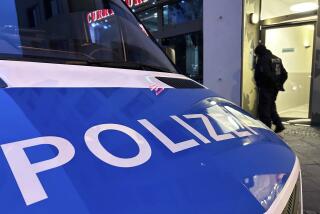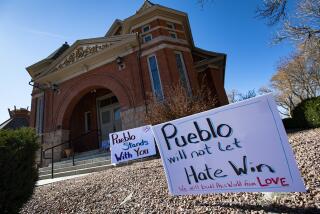FBI Looking for Ties Between U.S., German Hate Groups : Crime: Director Freeh discloses inquiry during German visit. U.S. is also seeking closer links to Italian law enforcement.
- Share via
WIESBADEN, Germany — Suspected links between extreme racist groups in Germany and U.S. hate organizations are under examination by the FBI, its director disclosed here Tuesday.
FBI Director Louis J. Freeh, completing 1 1/2 days of meetings with Cabinet ministers and top officials of BKA, the German counterpart of the FBI, stressed that the inquiry is just getting under way.
But his pledge to BKA President Hans-Ludwig Zachert, who provided leads for the inquiry, that it will be conducted “vigorously” marked the first official acknowledgment that the United States is investigating such transatlantic links.
Equally significant, Freeh’s statement illustrates the heightened cooperation that he and Ronald K. Noble, assistant secretary of the Treasury for enforcement, sought to achieve during meetings with their counterparts in Italy and Germany on a trip to the two countries that began Friday and ended Tuesday.
The moves to share information came amid mounting concern over surging organized crime in the former Soviet Union and East Bloc countries; fear that nuclear materials will fall into criminal hands, and attempts to counter racist violence by such groups as Germany’s skinheads.
The inquiry into any U.S. connection to what Zachert described as “xenophobic and racist attacks” in Germany has two aspects, officials explained. One involves “a particularly active person” in the Ku Klux Klan who is alleged to have played a role in the German violence.
Freeh, who is bringing back to Washington material that Zachert turned over to him on that case, described it as “an active case here in Germany which may have some connections, ramifications in the United States.”
The second aspect is postcards sent with label addresses from the United States and Canada to German Justice Minister Sabine Leutheusser-Schnarrenberger urging her to resign for seeking to prosecute an individual accused of inciting neo-Nazi fervor, according to Freeh.
Freeh directed Larry Potts, the FBI’s assistant director for criminal investigations, to ascertain whether the bureau’s guidelines permit looking into correspondence sent to a foreign official. Freeh, a former federal judge, noted that the U.S. Constitution affords strong protection for speech and the exchange of ideas “no matter how despicable those thoughts may be,” and he said he does not want the bureau to become “thought police.”
At the same time, Freeh said, “We will vigorously look to see if we can be of assistance to German authorities pursuing a criminal offense under their laws or deciding whether a violation of U.S. law has occurred.”
The FBI director discussed his concern about the possibility of nuclear materials falling into criminal hands in meetings Monday with Germany’s interior and justice ministers and Tuesday with BKA officials.
Freeh said the FBI is “very concerned” that criminal groups in the former Soviet Union and in the former Soviet-aligned republics could gain access to nuclear materials and devices and “use them either for profit or political reasons.”
Although Freeh and BKA officials provided no details of any nuclear thefts, a BKA official did note that his agency’s “nuclear-related cases” this year have totaled about 200, two times last year’s volume. But this category appeared to be made up largely of frauds by criminals seeking money for nuclear technology they did not actually possess, along with two cases involving extortion attempts.
Noble, the assistant Treasury secretary, cited the recent finding and killing of Colombian drug lord Pablo Escobar as a product of law enforcement cooperation. The U.S. Drug Enforcement Administration, he told BKA officials, alerted German authorities that members of the fugitive’s family were trying to enter Germany as the Colombian military pressed its search for him. Their entry was blocked--which, in turn, “unsettled” Escobar, who abandoned his usual caution and placed calls from his hiding place that led to his fatal showdown with security forces.
Richard C. Holbrooke, the new U.S. ambassador to Germany, said he plans to call his law enforcement team together next week to emphasize the cooperation that Freeh and Noble called for.
More to Read
Sign up for Essential California
The most important California stories and recommendations in your inbox every morning.
You may occasionally receive promotional content from the Los Angeles Times.










